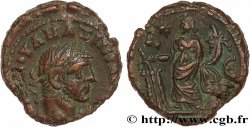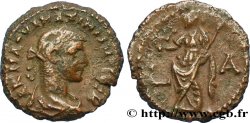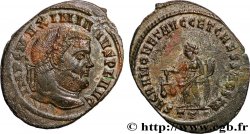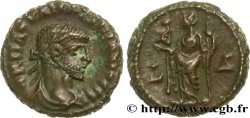brm_589371 - MAXIMIANUS HERCULIUS Follis ou nummus
115.00 €(Approx. 133.40$ | 101.20£)
Quantity
Add to your cart

Type : Follis ou nummus
Date: 300-301
Mint name / Town : Roma
Metal : copper
Diameter : 27 mm
Orientation dies : 6 h.
Weight : 9,16 g.
Rarity : R1
Officine: 2e
Coments on the condition:
Exemplaire centré à l’usure régulière, bien lisible et identifiable. Patine foncée
Catalogue references :
Obverse
Obverse legend : IMP C MAXIMIANVS P F AVG.
Obverse description : Tête laurée de Maximien Hercule à droite (O*).
Obverse translation : "Imperatore Cæsar Maximianus Pius Felix Augustus”, (L’empereur césar Maximien pieux heureux auguste).
Reverse
Reverse legend : SACRA MON VRB AVGG ET CAESS NN/ -|-// S(MASSUE).
Reverse description : Moneta (la Monnaie) debout de face, regardant à gauche, tenant une balance de la main droite et une corne d’abondance de la gauche.
Reverse translation : "Sacra Moneta Urbis Augustorum et Cæsarum Nostrorum", (La Monnaie sacrée de la ville de nos augustes et de nos césars).
Commentary
La massue fait partie de la marque d’émission, normalement réservée aux Herculéens (d’Hercule, Maximien et Constance Ier), mais nous pouvons aussi rencontrer le foudre avec les mêmes lettres d’officine.
The club is part of the issue mark, normally reserved for the Herculeans (of Hercules, Maximian and Constantius I), but we can also encounter the thunderbolt with the same letters of office
The club is part of the issue mark, normally reserved for the Herculeans (of Hercules, Maximian and Constantius I), but we can also encounter the thunderbolt with the same letters of office








 Report a mistake
Report a mistake Print the page
Print the page Share my selection
Share my selection Ask a question
Ask a question Consign / sell
Consign / sell
 Full data
Full data









